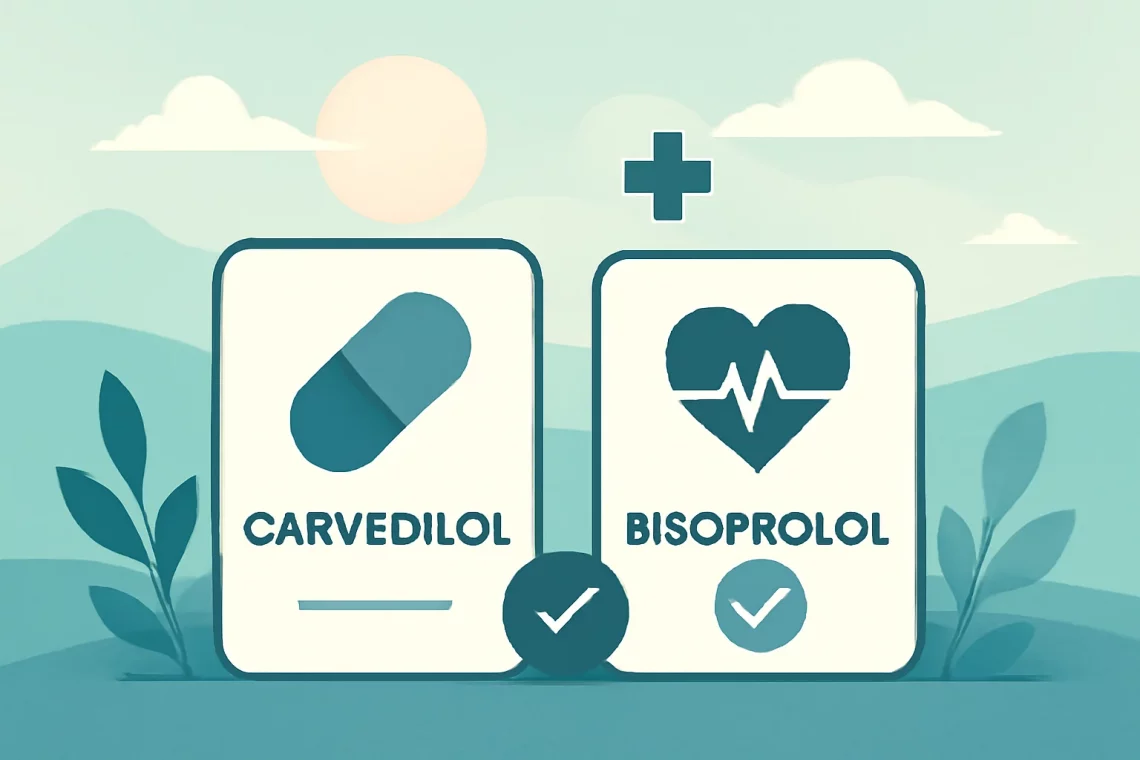
Carvedilol vs Bisoprolol Which Beta-Blocker Is Right for You?
Carvedilol and bisoprolol are two prominent medications commonly prescribed for managing cardiovascular conditions, particularly hypertension and heart failure. As beta-blockers, they share similar mechanisms of action but differ in their specific applications, side effects, and efficacy profiles. Understanding these differences is essential for both healthcare professionals and patients to make informed decisions about treatment options.
In recent years, the focus on cardiovascular health has intensified, with a growing emphasis on personalized medicine. This approach tailors treatment plans to individual patient needs, making it crucial to compare various medications. Carvedilol is known for its ability to provide additional benefits beyond heart rate reduction, such as vasodilation, which can lead to improved outcomes in heart failure patients. On the other hand, bisoprolol is frequently lauded for its selective beta-1 adrenergic receptor blocking, making it a preferred choice for patients with certain coexisting conditions.
The choice between carvedilol and bisoprolol can be influenced by various factors, including the patient’s overall health, specific cardiovascular condition, and potential side effects. This article delves into the characteristics, benefits, and considerations associated with each medication, providing valuable insights for those navigating their treatment options.
Understanding Carvedilol
Carvedilol is a non-selective beta-blocker that also possesses alpha-1 blocking properties. Its unique mechanism of action enables it to lower blood pressure and improve heart function by reducing heart rate and promoting vasodilation. This dual action makes carvedilol particularly effective for patients suffering from heart failure and hypertension.
The drug is typically prescribed to patients who require a comprehensive approach to manage their cardiovascular conditions. By helping to reduce the workload on the heart, carvedilol can enhance overall cardiac performance. Studies have shown that carvedilol can significantly reduce mortality rates among patients with heart failure, which underscores its importance in clinical settings.
However, carvedilol is not without its side effects. Commonly reported adverse effects include fatigue, dizziness, and hypotension. Due to its non-selective nature, it may also cause bronchoconstriction, making it less suitable for patients with asthma or chronic obstructive pulmonary disease (COPD). Therefore, careful patient selection is essential when considering this medication.
Moreover, carvedilol’s effects on heart function can lead to improved quality of life for those with chronic conditions. Patients often report decreased symptoms of heart failure, such as shortness of breath and fatigue, which can significantly enhance their day-to-day living. This improvement, coupled with the drug’s ability to reduce hospitalizations related to heart failure, emphasizes the importance of carvedilol in contemporary cardiovascular treatment strategies.
In conclusion, carvedilol serves as an essential option for managing complex cardiovascular disorders, particularly in patients who require both heart rate control and vasodilation. Its multifaceted benefits make it a valuable medication for many individuals dealing with heart-related issues.
Exploring Bisoprolol
Bisoprolol is a selective beta-1 adrenergic receptor blocker, primarily targeting the heart. This selectivity allows for effective heart rate reduction without significant effects on other tissues, making it a preferred choice for a range of patients, especially those with hypertension and stable heart failure.
The primary mechanism of bisoprolol is to inhibit the action of epinephrine and norepinephrine on the heart, leading to decreased heart rate and reduced myocardial oxygen demand. This action is particularly beneficial for patients with ischemic heart disease, as it helps alleviate symptoms like angina and improves exercise tolerance.
One of the advantages of bisoprolol is its favorable side effect profile compared to non-selective beta-blockers. Since it primarily targets beta-1 receptors, the risks of bronchoconstriction and other respiratory side effects are reduced. This makes bisoprolol a more suitable option for patients with underlying respiratory issues, such as asthma or COPD.
Clinical studies have demonstrated that bisoprolol effectively reduces cardiovascular morbidity and mortality. Patients often experience significant improvements in their quality of life, including reduced symptoms of heart failure and enhanced functional capacity. This has made bisoprolol a cornerstone in the management of heart failure, especially for those with preserved ejection fraction.
However, like all medications, bisoprolol is not without its potential side effects. Some patients may experience fatigue, dizziness, or bradycardia. It is crucial for healthcare providers to monitor patients closely, particularly during the initiation of therapy and after dosage adjustments.
In summary, bisoprolol stands out as a vital medication for managing hypertension and heart failure. Its selectivity and efficacy make it a favorable option for many patients, contributing positively to their overall cardiovascular health.
Comparative Efficacy and Safety
When considering carvedilol and bisoprolol, comparing their efficacy and safety profiles is crucial for informed decision-making. Both medications have proven effective in managing hypertension and heart failure; however, their mechanisms of action and side effects can influence the choice of treatment.
Carvedilol’s dual-action properties allow it to provide benefits beyond heart rate control, including vasodilation, which can be particularly advantageous for patients with heart failure. Its ability to improve cardiac output while reducing systemic vascular resistance makes it a valuable option for those requiring comprehensive heart failure management.
Conversely, bisoprolol’s selective beta-1 blockade allows for effective heart rate control with a lower incidence of side effects related to the respiratory system. This selectivity can be a decisive factor for patients with pre-existing respiratory conditions, where carvedilol might pose additional risks.
In terms of safety, carvedilol may present a higher risk of causing hypotension, particularly in older adults or those on multiple antihypertensive medications. Therefore, monitoring blood pressure during treatment initiation is essential to avoid adverse events. Bisoprolol, while generally well-tolerated, may still lead to bradycardia and fatigue in some patients, necessitating careful titration and follow-up.
Both medications have been associated with improved mortality rates in heart failure patients, though the specific benefits can be context-dependent. Clinical guidelines often recommend carvedilol for patients with systolic heart failure, while bisoprolol may be favored in cases of diastolic dysfunction or when a more selective approach is warranted.
Ultimately, the choice between carvedilol and bisoprolol should be individualized, taking into account the patient’s medical history, coexisting conditions, and potential side effects. Engaging in shared decision-making with healthcare providers can empower patients to choose the medication that aligns best with their health goals and lifestyle.
In conclusion, understanding the comparative efficacy and safety of carvedilol and bisoprolol is essential for optimizing treatment strategies in cardiovascular care.
Patient Considerations and Conclusion
When deciding between carvedilol and bisoprolol, several patient-specific factors must be taken into account. These include not only the individual’s medical history and current health status but also their lifestyle, preferences, and potential for medication adherence.
Patient education plays a vital role in promoting adherence to prescribed therapies. It is crucial for patients to understand the purpose of their medication, how it works, and the importance of following their regimen. This understanding can foster a sense of ownership over their health management, leading to better outcomes.
Additionally, lifestyle modifications, such as diet and exercise, should complement pharmacological treatments. Patients are encouraged to engage in regular physical activity, maintain a healthy diet low in sodium, and manage stress effectively. These lifestyle changes can significantly enhance the effectiveness of medications like carvedilol and bisoprolol.
Moreover, regular follow-up appointments are essential for monitoring the effects of the medication, managing side effects, and making necessary adjustments to the treatment plan. Open communication with healthcare providers allows patients to voice concerns or report any adverse effects, ensuring their treatment remains safe and effective.
In conclusion, both carvedilol and bisoprolol offer valuable options for managing cardiovascular conditions. The decision-making process should be collaborative, considering the unique needs and circumstances of each patient. By understanding the characteristics, benefits, and potential drawbacks of these medications, patients can engage in informed discussions with their healthcare providers to determine the best course of action.
**Disclaimer:** This article is for informational purposes only and does not constitute medical advice. Always consult with a healthcare professional regarding any health concerns or before starting a new medication.




